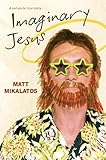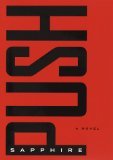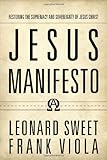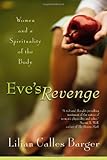Bell’s book is a lot to chew on; it’ll certainly reward several close readings. But it is well within the bounds of Orthodox Christianity, and asks some very good questions (it’s far outside the bounds of Orthodox New Calvinism, and some people mistake that for the whole of the Christian tradition, but rest assured they’re deluded). We need to be talking about Heaven, Hell and the picture of God that lies behind them. It’s a fun read and very accessible.
Continue readingBook Review: Imaginary Jesus
Given my current blog series and the EPIC series we’re doing (Encounters with Jesus), I couldn’t have come across this book at a more opportune time!
 Imaginary Jesus opens with the author, Matt Mikalatos, at his favorite Portland vegan restaurant with none other than Jesus. They’re chatting about life when a big, smelly guy named Pete walks in, introduces himself and asks Jesus, “What do you want with my friend Matt here?”
Imaginary Jesus opens with the author, Matt Mikalatos, at his favorite Portland vegan restaurant with none other than Jesus. They’re chatting about life when a big, smelly guy named Pete walks in, introduces himself and asks Jesus, “What do you want with my friend Matt here?”
Apparently Jesus’ answer isn’t good enough because Pete punches him square in the face and then chases him out of the restaurant.
Matt quickly discovers that Pete is none other than the Apostle Peter and “Jesus” isn’t really Jesus at all, but an Imaginary Jesus. And if Matt wants to meet the real Jesus, he has to find and face down his Imaginary Jesus. Along the way, he meets a whole host of imaginary Jesuses, from Men’s Retreat Jesus (whom he must pacify using Braveheart quotes), Magic 8 Ball Jesus (who only gives a few vague, stock-answers to every question) and Political Power Jesus (who gets into a fight with Hippie, Peacenik Jesus).
And as hilarious as Matt’s adventure is, it’s also choke-full of biting critiques of American Christianity at its best and worst. Matt’s critiques never come across as cruel because he consistently lampoons himself before anyone else, and always with clever, self-effacing humor.
Besides, who hasn’t wanted to see King James Jesus negotiate a hostage situation?
If you’ve tried to follow Jesus for any length of time, then you need to read this book. At its heart, it’s all about how often and easily we trade the real Jesus – the Jesus we meet in the Gospels – for someone who agrees with us, who won’t challenge us.*
Imaginary Jesus is no joke, and I guarantee you’ll read it more than once and pass it on to friends. You’ll want to tell them all about your favorite moments. Mine is the inner-tube race down the side of a mountain between Calvinist Jesus, Armenian Jesus and Open-Theist Jesus (though Matt is shrewd enough not to label them that).
Bottom line: A great summer read that gets you thinking while you’re laughing – it’s narrative theology at its best!
*I’m ashamed to admit that Matt got me several times with some of the Jesuses he encountered. I was so pleased with what this or that Jesus said I was certain he had to be the real deal. Curses!
Book Review: PUSH (Precious)
 PUSH is a punishing, brutal picture of a person who is a victim of the American Dream. That person is Precious, a sixteen-year-old girl who at the book’s opening is pregnant with her father’s child. For the second time. Rather inexplicably because of this, Precious is expelled from her school (during which we discover that she is also illiterate) and sent to an alternative school. Here she meets Blue Rain, a teacher who sees past Precious’ rough demeanor and begins to mentor her.
PUSH is a punishing, brutal picture of a person who is a victim of the American Dream. That person is Precious, a sixteen-year-old girl who at the book’s opening is pregnant with her father’s child. For the second time. Rather inexplicably because of this, Precious is expelled from her school (during which we discover that she is also illiterate) and sent to an alternative school. Here she meets Blue Rain, a teacher who sees past Precious’ rough demeanor and begins to mentor her.
The result is a journey out of the night that has been Precious’ life towards a day of possibilities for her. She begins to read and to evaluate herself and her life. She learns to see that she is damaged, that the life she is living is not normal or acceptable. She learns to protect herself from her parents.
And she learns to remember her past truthfully, to see her Self as fully human.
 Precious sweeps us along on her journey, touching on the disembodiment our culture creates. Some of the most painful moments occur when Precious envisions her ideal Self – skinny, pretty and white, and when she escapes her body as her father rapes her, imaging herself far off and away, detached from the prison of her body.
Precious sweeps us along on her journey, touching on the disembodiment our culture creates. Some of the most painful moments occur when Precious envisions her ideal Self – skinny, pretty and white, and when she escapes her body as her father rapes her, imaging herself far off and away, detached from the prison of her body.
The miracle of the book is the path we discover along with Precious, a path that surprisingly leads towards hope. She seems like such a lost cause, a victim of a broken, irredeemable system that destroys innocence, that crushes both the victim and the victimizer without respect for any persons. But through Blue Rain and the community of girls at the alternative school, the system is overcome and Precious steps onto the path toward redemption and healing.
PUCH is cruel and unrelenting; for ever two steps Precious takes forward she is shoved back. And the end is no fairy tale (:: ahem :: Blindside). But for those of us who live in a real broken world, hers is the story we need.
Bottom Line: PUSH asks you to consider what hope and healing look like in the real world. Do you have the courage to introduce yourself to Precious?
Book Review: Empire (Orson Scott Card)
 Anyone who reads Orson Scott Card – the author of the insanely awesome Ender saga – knows that he’s one of the best Science Fiction writers around. His stories reflect what is best and worst about our natures, and use gripping, thrilling, so-awesome-you-have-to-read-it-twice narrative to do it.
Anyone who reads Orson Scott Card – the author of the insanely awesome Ender saga – knows that he’s one of the best Science Fiction writers around. His stories reflect what is best and worst about our natures, and use gripping, thrilling, so-awesome-you-have-to-read-it-twice narrative to do it.
Empire is no different. It’s the story of the Second American Civil War.
The book feels as though it’s set tomorrow. Foreign terrorists assassinate the President and Vice President, and shortly thereafter a group of either right- or left-wing radicals take over New York City, declaring themselves to be the liberators of America. States quickly move to choose sides and the fighting begins.
What makes Card’s tale so compelling is the frightening plausibility of it. Card’s America is as sharply divided along party lines as is ours, so this war is not fought across the Mason-Dixon line; instead, it’s red-state/blue-state, urban/rural. The divisive, divided rhetoric could be taken from any number of email forwards so lovingly sent around – not to mention FOX News or CNN.
Perhaps most intriguing is Card’s comparison of America to Rome – not the Empire, but the Republic.
Card argues – through one of his more interesting characters – that America is not an Empire because were we to disappear as a nation today, our culture would not endure in the world the way Rome’s did. Rather, America exists as did Rome at the end of her republic phase: broken by infighting and divisions, unable to stand strong on the world stage.
Only when Rome was united under a strong leader was she able to become probably the greatest empire the world had ever known. And so Card begs us to ask, Will we follow those currents of history, ride along in Rome’s wake?
One of the more inflamatory passages in the book sums his probing well: “We don’t want individual liberty because we don’t want individual responsibility. We want somebody else to take care of us. If we had a dictator who did a better job of it than our presenty system, then as long as he pretended to respect Congress, we’d lick his hands like a dog.”
Bottom line: A great, quick thriller that will make you rethink your politics.
Bonus! Card just released a sequel called Hidden Empire. I can’t wait to read it!
Book Review: Columbine
 On April 20, 1999, I was a senior with less than a month left of my high school career. Seventh period had just begun when our English teacher came into the classroom with tears streaming down her face. “There’s been a school shooting, out in Colorado,” she said. I didn’t know it then, but Eric Harris and Dylan Klebold had been dead less than an hour, their surprisingly brief reign of terror over almost before it had begun.
On April 20, 1999, I was a senior with less than a month left of my high school career. Seventh period had just begun when our English teacher came into the classroom with tears streaming down her face. “There’s been a school shooting, out in Colorado,” she said. I didn’t know it then, but Eric Harris and Dylan Klebold had been dead less than an hour, their surprisingly brief reign of terror over almost before it had begun.
The following days bore the fruits of Eric and Dylan’s attacks: all but two of my high schools dozens of exterior doors were locked, forcing most of us to change our schedules. We all began giving the ‘goths’ second and third looks, fearing that they might be a part of the dread Trench Coat Mafia. Bullying of any kind was fiercely punished and any student who’d ever made any sort of threats was suddenly given the attention s/he’d been craving. And all our churches were abuzz with the story of Cassie the Columbine Martyr, who’d told the killers she believed in God, and was executed for it. But for all the supposed safety measures we’d put into place, the general feeling that last month of school was one of confusion and chaos rather than safety and order. Because no one could answer convincingly that singular, burning question everyone was asking: Why did Eric and Dylan do it?
God, and was executed for it. But for all the supposed safety measures we’d put into place, the general feeling that last month of school was one of confusion and chaos rather than safety and order. Because no one could answer convincingly that singular, burning question everyone was asking: Why did Eric and Dylan do it?
It’s been just over a decade since that day, and still the Columbine massacre remains the quintessential school shooting for many of us. In many ways, it defined my generation as much as (and arguably more so than) 9/11. And all of us have so many unanswered questions, so I picked up Dave Cullen’s book with a mixture of excitement and trepidation. I wasn’t sure what to expect, but I know what I got:
Columbine is a respectful, fair and comprehensive look at an important, formative moment for my generation.
 I was immediately surprised by how many myths Cullen debunked. Eric and Dylan weren’t a part of the Trench Coat Mafia. The killings weren’t retaliation for bullying. Cassie didn’t stand up for Jesus (she didn’t have the chance; the boys just killed her. Her testimony actually came from another girl who had already been shot, but still claimed to believe in God.) Probably most surprising was the profile Cullen created of each of the boys. Dylan was a sad, depressed loner who – according to his journals – desperately wanted to be loved. Eric was a clinically-diagnosable psychopath who lied to everyone around him and dreamed of exterminating the entire human race.
I was immediately surprised by how many myths Cullen debunked. Eric and Dylan weren’t a part of the Trench Coat Mafia. The killings weren’t retaliation for bullying. Cassie didn’t stand up for Jesus (she didn’t have the chance; the boys just killed her. Her testimony actually came from another girl who had already been shot, but still claimed to believe in God.) Probably most surprising was the profile Cullen created of each of the boys. Dylan was a sad, depressed loner who – according to his journals – desperately wanted to be loved. Eric was a clinically-diagnosable psychopath who lied to everyone around him and dreamed of exterminating the entire human race.
What truly made the book so good, however, was Cullen’s treatment of the supporting cast – the parents of the victims, the survivors and the investigators researching the big Why question. Cullen treats each person fairly, and even the boys don’t emerge in his telling as full-fledged villains (well, Eric is pretty close by the end). The book opens with the shootings but then splits into two narratives: one beginning two years before the event, tracing the boys’ steps to Judgment Day, and the other following the fallout and healing afterwards. Cullen weaves the two stories together masterfully, so the effect becomes one of fatalist tragedy running headlong beside hope. And that is perhaps the greatest miracle of Columbine – that the terror of Eric and Dylan’s choices have passed us by. In Littleton, Colorado, Columbine is the name of a school again – not a tragedy.
Bottom Line: Columbine reexamines an old tragedy through Cullen’s educated and cathartic narrative.
Book Review: The Jesus Manifesto
 This book’s intention is to make you uncomfortable. In that sense, the authors – Leonard Sweet and Frank Viola – succeed admirably, but probably not in the way they’d hoped, at least not for me.
This book’s intention is to make you uncomfortable. In that sense, the authors – Leonard Sweet and Frank Viola – succeed admirably, but probably not in the way they’d hoped, at least not for me.
Of the two Leonard Sweet books I’ve read so far (this one and The Gospel According to Starbucks), Manifesto is much more in-your-face. Of the two Viola books I’ve read so far (this one and Pagan Christianity), Manifesto is probably equally cruel. This leads me to believe that Frank Viola is a very angry man who dragged Dr. Sweet along for the ride. I don’t know either of the authors though. so to the book!
What’s in the Book
Jesus Manifesto is a relatively quick (under 200 pages) attack on what – according to the authors – is the most serious problem in contemporary American Christianity: a lack of focus on Jesus. Viola and Sweet load both barrels and blast away at pretty much anyone that’s not them: Christianity has become about self-improvement. Or maybe it’s about social justice. No, it’s about doing the right things! Whatever the nature of the established institution, they will deconstruct it. And I don’t necessarily disagree with many of their critiques of the modern Church.
But.
Sweet and Viola never bother to construct anything. They don’t offer answers to the critiques they levy so handily. "The question is not ‘What would Jesus do?’ but ‘What does Jesus want to do now through us?’" Okay. so how do we teach people the difference? "The essence of Jesus’ being is not His; he is continually receiving it from the Father. Could it be that those who are remade in Christ’s image live in a similar fashion?"
What? So we just ask "WWGD" instead? How is that significantly different?
Elsewhere, the authors claim that Jesus is not a social agenda. Okay, so does the Kingdom of God have political implications? Yes, apparently. er. maybe not. um. Jesus! Look at what Jesus did, but don’t imitate it! Or maybe you do.
The book does make great points. Lots of them, in fact. But just when you’re about to underline something helpful, the authors backpedal. The only word you’re really safe underlining in the book, in fact, is "Jesus". And while this may have been Sweet & Viola’s point, it’s not done in a clever enough way to be helpful. It ends up being more maddening and confusing.
And in the end, while I have my issues with the contemporary Church, maybe I’m just not ready to throw the Baby out with the manger hay.
The verdict? The book stands on Jesus, but the explanation of that stand is too confusing to be very helpful.
Disclosure of Material Connection: I received this book free from Thomas Nelson Publishers as part of their BookSneeze.com book review bloggers program. I was not required to write a positive review. The opinions I have expressed are my own. I am disclosing this in accordance with the Federal Trade Commission’s 16 CFR, Part 255: “Guides Concerning the Use of Endorsements and Testimonials in Advertising.”
Book Review: The Given Day
If you haven’t figured it out by now, I’m quite the Dennis Lehane fan. The Given Day is his most recent book (2008), his longest book (just over 700 pages) and easily his most unique.
It’s a beautiful, tragic and quintessentially American novel.
Say goodbye to Lehane the noir crime novelist (or at least, see you later) and say hello to Lehane, the Chronicler of All Things American. The Given Day is a gritty, tough and uncompromising look at America in all her… well, not glory. And that’s precisely the charm. Day is honest about our shortcomings. Lehane clearly exposes our prejudice and ignorance for what they are while reminding us that those are hardly unique to America. This book is cruel, but not unnecessarily so. At the end of the Day, Lehane’s America is the cauldron of post-modernity.
Everyone’s worried about immigration and whether or not America the Great is becoming America the Red. Some are seeing socialists around every corner, and they all complain that the immigrants are coming here unable to speak the language and taking all our jobs. There are wars and rumors of wars. Families rise and fall, and all the great institutions (government, big business, the religious institutions) are seen for the corrupt, self-serving machines they are.
You’d think The Given Day is a story of our own times. But you’d be wrong.
The Given Day follows Aiden “Danny” Coughlin, a second-generation Irish cop in Boston at the close of the Great War, and Luther Lawrence, a black man from Columbus, OH who ends up in Boston by way of Tulsa (and yeah, that’s a good story in-and-of itself.). These two men become the lens through which we explore all the racism, suspicion, class warfare and violence the American Empire has to offer.
The immigrants are Italian, not Hispanic, and the socialists are union organizers, not health-care supporters, but the rhetoric and the fears behind the rhetoric are the same. Lehane refuses to take sides, and instead uses the humanity and complexity of his characters to raise the level of debate on these and other issues. In the end, he argues that to be America is to exist in the tension between progress and power. Between change and entrenchment. Between the big business and the worker, the government and the immigrant.
And for those of us in the midst of all of it, what really makes us American is our freedom, our ability to choose. To rail against the institutions in all their evil (be it the active evil of the big businesses or the passive evil of the Church’s irrelevance). Even with all the forces of our world aligned against us – the (corrupt) government, organized religion, the class (or is it caste?) systems and sometimes even our own families, we can still stand up and choose to fight for what we want. Life doesn’t always (or even usually) give us a happy ending. It’s better, then, to find happiness in the endings we have.
The Given Day pictures America as a perfect post-modern Empire.
Lehane effectively mythologizes an overlooked but important period of American history, demonstrating that the more things change here, the more they stay the same. If it’s not The Great American Novel, it’s at least a great picture of what it means to be American. And if you’re still not convinced, Babe Ruth frames and organizes the whole story. All that’s missing is the Apple Pie.
Bottom Line: This book is a wild adventure that probes the heart of what it means to be free.
I was only left wondering what a Christian reading of The Given Day might look like. We could rage with Danny against the injustice of the Empire or weep with Luther at the violence that consumes us, even pitting us against each other. But we can do more than settle into an existential despair that finds joy despite the evil of the systems that stand against us. We can work toward their redemption, get back up even after they crush us down. We can work toward an ending that’s not happy despite our circumstances, but hopefully even because of them.
Book Review: Eve’s Revenge
 Lilian Calles Barger has written a profound, powerful meditation on what it means to be a woman in the (post) modern world. Eve’s Revenge argues that our culture teaches women to hate their bodies, to view them as enemies on the path to self-fulfillment. She explores the roots of this worldview, the disembodied reality it creates, and the insufficient response (thus far) of the various aspects of the Feminist movement. True to her thesis, Barger doesn’t settle for abstract, theoretical answers to the disintegrated and dissatisfied world we experience. Ultimately, Barger believes that the solution is an embodied faith in the crucified and resurrected Jesus of Nazareth, and she closes her meditation with practical, concrete advice for moving forward.
Lilian Calles Barger has written a profound, powerful meditation on what it means to be a woman in the (post) modern world. Eve’s Revenge argues that our culture teaches women to hate their bodies, to view them as enemies on the path to self-fulfillment. She explores the roots of this worldview, the disembodied reality it creates, and the insufficient response (thus far) of the various aspects of the Feminist movement. True to her thesis, Barger doesn’t settle for abstract, theoretical answers to the disintegrated and dissatisfied world we experience. Ultimately, Barger believes that the solution is an embodied faith in the crucified and resurrected Jesus of Nazareth, and she closes her meditation with practical, concrete advice for moving forward.
Barger writes as a women, to and for women, so as a male reader, I felt a bit as though I was listening in on someone else’s conversation, but never excluded. Rather, I was challenged to reflect on what part I played (as a male) in creating the world Barger illuminates. Even more, Barger’s passion drew me into her writing. I was shocked at the reality most women today live; I mourned when I asked my wife, Amanda, about Barger’s commentary and she confirmed its accuracy. As an academic, Barger demonstrates that she is as well-versed and clever as anyone, and the emotion of her rhetoric was a breath of fresh air. I didn’t feel as though I was just listening to Barger’s mind; I felt as though she was baring her soul.
Barger’s book is a welcome, refreshing voice in the ongoing conversation about sex and sexuality. With honesty, clarity and transparency, Barger invites us to find wholeness by resisting what our culture teaches us about ourselves – body and soul.
